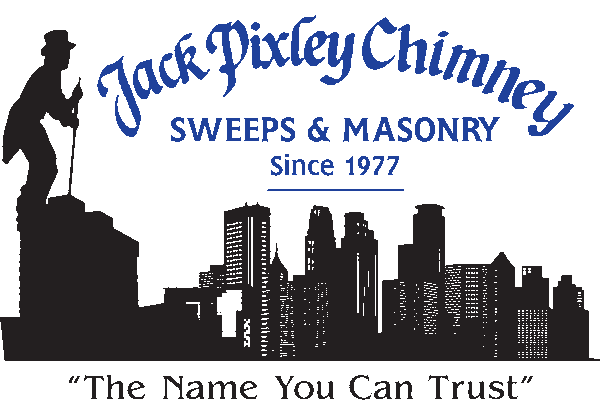Temperatures are dropping, leaves are changing and starting to fall, and many parts of the country have experienced the first snowfalls of the season. Fall is in full swing, and winter is just around the corner! With the change in the weather comes a change in how we use our heating appliances; fall and winter are known as burning seasons because of how often fireplaces, inserts, stoves, and other fuel-burning heating appliances are used.
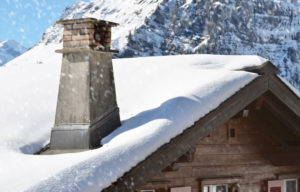 The Farmer’s Almanac has predicted that this winter will have big chills and strong storms; a fireplace can help create a warm, welcoming environment in your home no matter the weather. While chimney systems are built to burn fires year after year, they do need regular care, maintenance, and upkeep in order to operate safely and efficiently. The following tips and tricks can help ensure your fireplace and chimney are ready for the arrival of burning season.
The Farmer’s Almanac has predicted that this winter will have big chills and strong storms; a fireplace can help create a warm, welcoming environment in your home no matter the weather. While chimney systems are built to burn fires year after year, they do need regular care, maintenance, and upkeep in order to operate safely and efficiently. The following tips and tricks can help ensure your fireplace and chimney are ready for the arrival of burning season.
1. Schedule a sweeping and inspection as soon as possible
Burning season may be underway, but it’s still not too late to schedule a chimney sweeping and inspection! A chimney sweeping should be done at least once per year to remove soot, ash, and flammable creosote from the flue; likewise, inspections should be done annually to check for signs of damage or deterioration to the fireplace or chimney.
A chimney sweeping by a CSIA-certified chimney sweep can help ensure your fireplace is burning efficiently, extend the life of your chimney system, and significantly reduce the risk of a chimney fire. Fall and winter are the busiest seasons for chimney sweeps; because of this, it may take several weeks before your appointment can be scheduled. Want to beat the rush next year? Plan ahead and schedule your chimney maintenance in the offseason!
Have a gas fireplace? You still need to schedule a chimney inspection! Annual inspections of gas fireplaces are important to ensure that no components have shifted, no gas leaks are occurring, and the venting system is undamaged and has no blockages.
2. Choose the right firewood
Whether you have an insert, open-hearth fireplace, stove, or even an outdoor fire pit, the best fuel for your wood-burning fire is seasoned firewood. According to the CSIA, seasoned firewood is “wood that has a moisture content between 20-25%.” This low moisture content is achieved by cutting, stacking, and exposing wood to the elements for 6-12 months.
Seasoned wood produces less smoke, burns at a higher temperature, and produces less creosote than freshly cut or “green” firewood. Burning green wood should be avoided whenever possible; in addition to being difficult to ignite because of the high moisture content in the wood, green wood burns dirtier and produces excessive smoke – and creosote. Burning large amounts of greenwood often result in a mid-season call to the chimney sweep!
While it can be tempting to burn paper, packaging materials, or leftover scrap wood in the fireplace – particularly when unwrapping presents during the holidays – only firewood should be used in indoor fireplaces. Styrofoam, stained or painted wood, or even printed paper can release dangerous chemicals when burned; this can impact the air quality in your home or cause respiratory issues for friends and family. Likewise, burning plastics can melt onto fireplace components and cause long term damage to the chimney system.
3. Maintain smoke detectors and safety equipment
In the United States, three out of five fire-related deaths were in homes without working smoke alarms. Regularly testing and replacing smoke alarms, carbon monoxide detectors, and fire extinguishers are an important part of keeping friends and family safe when the fireplace is in use. Smoke and carbon monoxide detectors should be on every level of a home, as well as outside sleeping areas. Test alarms every six months and replace batteries as needed; replace safety equipment every 7-10 years to ensure they meet modern safety standards and technology.
A fire extinguisher should be purchased and placed in an easily-accessible area near the fireplace. Available at almost every big box or home improvement store, a working fire extinguisher can be used to prevent an unsafe situation from turning dangerous. A log rolling out of the fireplace, a fire burning out of control, or a stray ember landing on nearby furnishings are all situations where a fire extinguisher can help prevent devastating damage to a home.
4. Keep décor away from the fireplace
The stockings may have been hung by the chimney with care – but they need to be moved before the fireplace is used! During the holidays – and year-round – our mantles can hold décor such as garland, bunting, mementos, and more. Moving any hanging mantle décor out of the way before the fireplace is used can prevent stray sparks or embers from accidentally igniting a stocking; likewise, all carpets and other furnishings should be at least three feet away from the fireplace when in use.
Contact Jack Pixley Sweeps for your chimney needs this burning season
Following a few simple tips can keep your home safe and stress-free this burning season. Since 1977 staff has been providing the Minneapolis/Saint Paul area with quality, trustworthy fireplace and chimney services. For more information on fireplace safety or to schedule your next chimney sweeping or inspection, contact Jack Pixley Sweeps today!
Although winter weather may prevent some exterior chimney repairs from being made, it is the perfect time to give your fireplace a facelift! While fireplaces are a timeless home feature, fireplace facades may be in need of a makeover; dirty masonry, damaged bricks, or a style that simply doesn’t match the rest of your décor can all be reasons to invest in a fireplace facelift. When working with the team of fireplace experts at Jack Pixley Sweeps to design your new fireplace, the only limit is your imagination!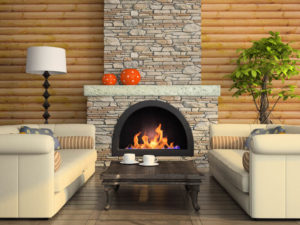
Benefits of remodeling an indoor fireplace
The fireplace is often the focal point of the room; a fireplace makeover can ensure you get the perfect design for your unique style. The following are three reasons to consider a fireplace remodel this winter.
1. Add lasting value to your home
Fireplaces are one of the most requested home features in real estate. The National Association of Homebuilders found that potential buyers would pay up to $1,400 more for a home with a fireplace. In the same survey, 46% of buyers said looks were the most important aspect of a fireplace. Updating the fireplace with a facelift can help add lasting value to your home – and create a beautiful design element in any room.
2. Make a small change – or a big one
The first step in a fireplace remodel is researching what style and design you would like. Whether your dream fireplace is sleek and modern or rough and rustic, our team of fireplace experts at Jack Pixley Sweeps can help you design – and build – your dream fireplace.
While a total fireplace rebuild is often the best way to custom-design an entirely new fireplace, there are a number of small changes that can still have a big impact. Replacing old, warped fireplace doors with new glass doors can help a fireplace look newer while also burning more efficient. Likewise, replacing the mantle is another way to overhaul the look of an entire room – not just the fireplace.
3. Change fuel sources with an insert
Interested in changing fuel sources? Think about installing a new, energy-efficient fireplace insert! Fireplace inserts are available in a wide variety of sizes, styles, and fuel sources; installing a new insert can modernize a fireplace while making the entire chimney system more efficient.
When should I schedule my appointment?
Winter months are the perfect time to schedule interior fireplace remodels. Because interior work is not impacted by the weather, our masons can build your new fireplace even if the weather outside is frightful! Likewise, we recommend that homeowners schedule fireplace remodels after the holidays; this prevents construction from impacting family get-togethers or holiday parties.
Remodeling the fireplace over the winter is also ideal if you are preparing to sell your home. Spring is the most popular season for both buying and selling in real estate; having the fireplace remodeled over the winter ensures your heating appliance is showroom ready when spring arrives.
Help your fireplace avoid the winter blues by investing in a fireplace remodel! It can add value, help update your home, and create an entirely new look – without building an entirely new fireplace. Even if you want to schedule after the holidays are over, contact the staff at Jack Pixley Sweeps today. Fall and winter are our busiest season, and scheduling early helps ensure your appointment gets on the books!
At Jack Pixley Sweeps, safety is our top priority. Through high-quality fireplace and chimney services and client education, 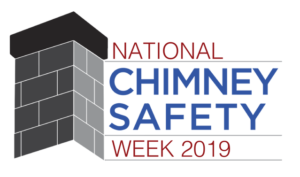 we aim to keep our friends and neighbors’ homes safe, warm, and efficient. We are proud participants in Chimney Safety Week 2019.
we aim to keep our friends and neighbors’ homes safe, warm, and efficient. We are proud participants in Chimney Safety Week 2019.
In the United States, there are more than 22,000 chimney fires each year, endangering lives and costing more than 125 million dollars in damages. The goal of Chimney Safety Week is to help reduce the number of accidental chimney fires by educating both homeowners and chimney professionals about the latest trends and best practices in fire safety and prevention.
Facts about chimney fires
Chimney fires are a risk when using any fireplace, stove, or insert. However, chimney fires can be prevented by chimney sweepings, inspections, regular maintenance, and following safe burning guidelines. The following are some eye-opening facts about chimney fires many homeowners may not know.
- The majority of chimney fires go undetected. Many chimney fires are so small they go undetected. This does not mean, however, that the chimney is not damaged; no matter how small, chimney fires can cause serious damage to the flue.
- Chimney fires can reach up to 2,000 degrees
- Creosote buildup is the main cause of chimney fires. Creosote is a naturally occurring – and extremely flammable – byproduct of combustion. When not removed from the chimney during chimney sweepings, creosote can accumulate in the flue; stray sparks or embers from the fireplace can then cause creosote to ignite and lead to a chimney fire.
- Signs of a chimney fire include a discolored chimney cap, warped metal on the damper, creosote flakes in the flue box, cracks in the masonry, and more.
Fireplace safety tips
Our fireplaces and chimneys help keep our homes warm, but they can be dangerous when poorly maintained or when used incorrectly. The following are just a few safety tips to help prevent accidental chimney fires,
- Have the chimney swept at least once per year. Chimney sweeping is the single most important part of chimney maintenance and fire prevention. A chimney sweeping by a certified professional removes soot, ash, and creosote from the fireplace and flue; this ensures that the chimney can vent safely and efficiently no matter the season.
- Do not leave fires unattended. No matter the size or experience level of the homeowner, fires should never be left unattended. This safety tip is especially important in homes with pets or small children who could easily be injured by fire. Glass doors, grates, or fences can be used to help keep little hands – and paws – away from the fireplace when it is in use.
- Keep décor away from the fireplace. Hanging stockings on the mantle may be one of the most popular ways to decorate for the holidays, but home décor should always be removed before using the fireplace. Keep carpets, furnishings, and other décor at least three feet away from the fire to prevent scorch marks – and accidental fires.
- Properly store fireplace ashes. Fireplace safety doesn’t end when the fire goes out. Proper ash storage is an important part of preventing fires in trashcans or dumpsters; ashes should always be stored in a dedicated metal container and should not be mixed in with household trash.
Using these tips and having your chimney swept annually will help you decrease your risk of a chimney fire and keep your family and home as safe as possible. For questions, call Owens Chimney today!
Winter in Minnesota arrives sooner, lasts longer, and is significantly colder than many other states. Because of this, fireplaces are often an integral part of keeping our homes – and our families – warm all winter.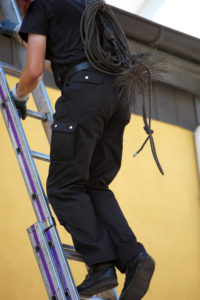
While our fireplaces may be used heavily during the fall and winter, many chimney repairs cannot be made in cold weather. This sometimes leads homeowners to rush, hiring the first company they find instead of one that can provide long-term, quality repair.
How masonry damage affects your chimney
Bricks and mortar are built to withstand the elements. However, even the best-constructed chimneys may suffer due to Minnesota’s extremely harsh winters. Because of this, repairs may be necessary to keep the fireplace burning safely and efficiently.
One of the most common causes of masonry damage is the freeze-thaw cycle. The freeze-thaw cycle occurs when small amounts of water become trapped in the bricks and mortar of the chimney. When temperatures drop below zero the water freezes and expands; the creates progressively larger and larger holes and cracks in the chimney.
Finding the right chimney repair company
If the fireplace is not working properly or the chimney is starting to show signs of wear and tear, it is important to have these issues addressed as soon as possible – particularly in a part of the country where winter masonry repairs are often impossible. However, it is still worth the effort to spend time researching a chimney company before hiring. This can help ensure you hire a qualified, trained mason – even if it means waiting until spring to have repairs made.
Things to look for in a masonry repair company
Not all masonry repair companies or chimney sweeps are created equally. Because of this, it is important that homeowners do their research before jumping into repairs with a new company. Unfortunately, this sometimes means waiting until spring until repairs can be made. The following are a few of the things to look for before hiring a masonry repair company.
- Contractor’s license – A reputable repair company should hold a contractor’s license. Not only does this ensure they are qualified to make repairs, but it also protects homeowners; in the event, there is a dispute over the repairs, the state’s dispute resolution program may help compensate homeowners.
- Proof of insurance – Verifying proof of insurance before a chimney company starts making repairs protects both homeowners and workers. For homeowners, insurance ensures you will not be sued in case a worker is damaged as well as protecting you in the event damages are made to the home.
- Reputation and reviews – Most reputable companies are happy to provide potential customers with a list of reviews or referrals. Likewise, the Better Business Bureau or websites like Angie’s List can be helpful in vetting the reputation of potential companies.
In northern states like Minnesota, chimney repairs need to be made before Mother Nature drops the temperature below freezing until spring. However, it is still important to research the company you are hiring before trusting them to work on your fireplace or chimney. For more information on what to look for when hiring a chimney sweep company, contact the CSIA-certified chimney sweeps at Jack Pixley Sweeps today.
Fireplaces remain one of the most requested and sought after home features – across all ages and income brackets. A study by the National Center for Real Estate Research (NCRER) found that 40% of home buyers are willing to pay more for a 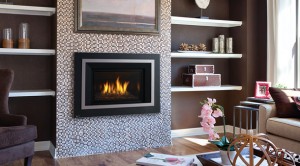 home with a fireplace and that having a fireplace increases a home’s value by up to 12%.
home with a fireplace and that having a fireplace increases a home’s value by up to 12%.
Not all fireplaces are created equally, however. Open hearth masonry fireplaces are an impressive focal point, but most are inefficient and require serious upkeep and maintenance.
One way to modernize an open-hearth fireplace – while adding value to your home – is by installing a fireplace insert. Fireplace inserts are an excellent solution that can make your fireplace more efficient, allow you to switch fuel sources, save time, and avoid the hassle – and expense – of a major fireplace renovation.
What is an insert?
A fireplace insert is still a fireplace: it burns fuel to produce heat. Inserts, however, differ from open hearth fireplaces in that they operate using closed system combustion; in a closed system, less heated air is lost up the chimney and the fireplace can more efficiently heat a home. According to the Hearth, Patio, and Barbecue Association (HPBA), installing a fireplace insert to an existing open-hearth fireplace can help reduce energy bills by as much as 40 percent.
Types of inserts
There is no one single size or style of insert. Instead, there is a wide variety of fireplace inserts to match the aesthetics of your home – as well as meet your heating needs.
Choosing the fuel source is often the most difficult choice when picking a new fireplace insert. Wood inserts remain popular as many homeowners want the look and feel of a real, wood-burning fire. Likewise, wood is considered a green fuel source; many are surprised to learn that burning wood is carbon neutral as trees over their lifetime absorb the same amount of carbon dioxide and the fire produces.
Gas is an equally popular fuel choice for fireplace inserts. Gas inserts provide heat at the press of a button with little cleaning or maintenance. While less environmentally friendly, gas is an inexpensive fuel source that provides consistent and controllable heat.
Three benefits of installing a new insert
There are a number of benefits to installing an insert.
1. Better efficiency. Open-hearth fireplaces tend to be inefficient and lose lots of heat up the chimney. Inserts with closed-circuit combustion, however, are significantly more efficient.
2. Fewer emissions. Because open-hearth fireplaces are individually built, their emissions cannot be regulated or controlled; this leads to open-hearth fireplaces being considered as a major cause of air pollution. Inserts of all fuel sources must be regulated, tested, and certified by the EPA. Minimum standards that produce significantly less particulate emissions must be met in order for an insert to be sold.
3. Avoid masonry repairs. A damaged fireplace must be repaired before it can be safely used. Some masonry repairs can be avoided, however, by installing a new insert. Because inserts can be installed into existing fireboxes, a flue resizing may be all that’s needed to begin enjoying the new fireplace.
A fireplace insert is an easy to install, energy-efficient way to upgrade your existing open-hearth fireplace. For more information on the benefits of fireplace inserts, contact Jack Pixley Sweeps today!
 The Farmer’s Almanac has predicted that this winter will have big chills and strong storms; a fireplace can help create a warm, welcoming environment in your home no matter the weather. While chimney systems are built to burn fires year after year, they do need regular care, maintenance, and upkeep in order to operate safely and efficiently. The following tips and tricks can help ensure your fireplace and chimney are ready for the arrival of burning season.
The Farmer’s Almanac has predicted that this winter will have big chills and strong storms; a fireplace can help create a warm, welcoming environment in your home no matter the weather. While chimney systems are built to burn fires year after year, they do need regular care, maintenance, and upkeep in order to operate safely and efficiently. The following tips and tricks can help ensure your fireplace and chimney are ready for the arrival of burning season.